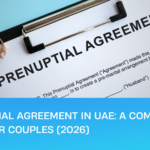What is the difference between a Power of Attorney and a Will?

Planning for the future—especially when it comes to legal and financial matters—can feel overwhelming, particularly if you are unfamiliar with the laws in your jurisdiction. The good news is that you can safeguard yourself and your loved ones by preparing the right documents in line with legal requirements.
Two of the most important documents for this purpose are a Will and a Power of Attorney (POA). Both aim to deal with your assets and affairs, but in very different ways:
- A POA is used during your lifetime.
- A Will only takes effect after your death.
What is a Will?
A Will is a legal document that determines how your assets will be distributed after your death. It also allows you to:
- Appoint an executor who will be responsible for carrying out your wishes.
- Designate a guardian for your minor children.
- Specify how you want your estate, belongings, and finances to be managed after your passing.
🔗 See our complete guide on Wills in the UAE
What is a Power of Attorney (POA)?
A Power of Attorney (POA) is a legal document that authorizes another person (called an agent or attorney-in-fact) to act on your behalf in business, legal, or financial matters.
For example, if you are unavailable or unable to manage your affairs, your appointed agent can:
- Pay bills and manage your finances.
- Handle property management or repairs.
- Buy or sell assets such as cars or real estate.
- Run a business on your behalf.
🔗 Learn more about how to make a Power of Attorney in the UAE.
Key Difference Between a Power of Attorney and a Will
- A POA is valid only during your lifetime and becomes invalid upon your death.
- A Will has no effect during your lifetime but comes into force only after your death.
Together, these two documents complement one another in ensuring your affairs are managed both during your lifetime (POA) and after your passing (Will).
| Power of Attorney (POA) | Will |
|---|---|
| A POA authorizes another person to legally act on your behalf during your lifetime. | A Will records your wishes for how your estate will be managed and distributed after your death. |
| Can be specific (limited to certain acts) or general (broad powers). | Specifies who will inherit your assets and who will care for minor children. |
| Becomes valid once signed and notarized before the Notary Public (and other authorities, if required). | Becomes effective only after the testator’s death. |
| In Dubai, a POA must be notarized by the Notary Public at Dubai Courts or the Ministry of Justice. In Abu Dhabi, it must be notarized by the Notary Public at the Abu Dhabi Judicial Department (ADJD) or the ADGM Courts. |
In Dubai, a Will must be notarized either by Dubai Courts or the DIFC Wills Service Centre. In Abu Dhabi, it must be notarized either by the Abu Dhabi Judicial Department (ADJD) or the ADGM Courts. |
| Can be issued for a fixed or unlimited period but always ends upon the principal’s death. | Has no expiry; remains effective indefinitely after death. |
| Terminates automatically upon the death of the principal. | Takes effect only upon death. |
| You may appoint multiple attorneys, either to act jointly or individually. | You may appoint multiple executors or guardians; they usually act independently. |
| It can be revoked anytime by the principal during their lifetime. | It cannot be revoked once the testator has passed away. |
In summary, A POA helps manage your affairs while you are alive, while a Will ensures your estate is distributed according to your wishes after you pass away. Having both documents in place gives you and your loved ones legal clarity and financial security at every stage of life.
Need help drafting or notarizing your Power of Attorney or Will in the UAE? Contact POA.ae today for expert legal assistance.
Frequently Asked Questions (FAQs)
- Do I need both a Will and a Power of Attorney?
Yes. A POA ensures your affairs are handled while you are alive but unable to manage them yourself. A Will ensures your estate is distributed according to your wishes after your death. Having both provides full protection.
If you’re an expat, here’s what you need to know about making a Will in the UAE.
- Can I change my Will or POA later?
Yes. Both documents can be updated during your lifetime as long as you are legally competent. Once you pass away, your Will cannot be changed, and your POA automatically becomes invalid. - Who should I appoint as my agent (POA) or executor (Will)?
Choose someone you trust completely. They should be responsible, organized, and ideally familiar with your financial or family situation. - Is a handwritten Will or POA valid?
This depends on your jurisdiction. In the UAE, both Wills and POAs must be notarized before the appropriate authority to be legally enforceable.
5. What happens if I don’t have a Will or POA?
Without a POA, no one can legally act on your behalf if you become incapacitated. Without a Will, your estate will be distributed according to the laws of inheritance in your jurisdiction, which may not reflect your wishes.
Disclaimer: The content on this page is for general information purposes only and does not constitute as legal advice nor should it be used as a basis for any specific action or decision. Nothing on this page is to be considered as creating a lawyer-client relationship or as rendering of legal advice or legal services for any specific matter. Users of this website are advised to seek specific legal advice from their lawyer or a legal counsel regarding any specific legal issues.





